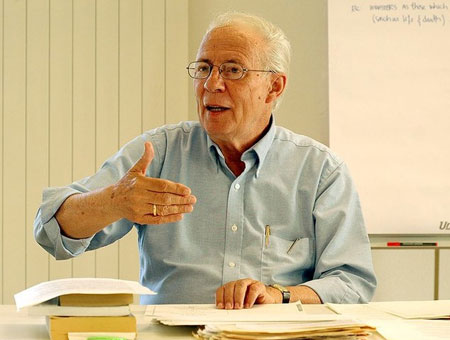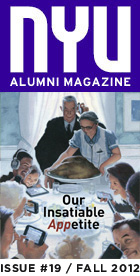alumni profile
The Opposition of Absolutes
Friedrich Ulfers / GSAS ’61, ’68
by Jason Hollander / GAL ’07
Toward the end of 1944, Allied Forces airplanes began pummeling Giessen, a small German city north of Frankfurt, which would be 75 percent destroyed by World War II’s end. During the nighttime raids, 10-year-old Friedrich Ulfers would huddle with his mother (his father had been conscripted to fight Russians in the East) in their apartment building’s cellar as the neighborhood shook and screamed. Most locals were gathered nearby in the Nazi’s official “bombproof” shelter, but Mrs. Ulfers had an awful feeling the one time she brought her son there. Her instinct proved right: Shortly before the war ended, the bunker gave way, fatally crushing more than 300 people.
Ulfers’ parents never joined the Nazi party, but he says that social protocol in his hometown made it clear “you had to conform.” He recalls his teachers imploring students to report derogatory statements about the Third Reich made by family or friends, and a popular taunt in the schoolyard: “Watch out, or you’ll go to Dachau.” So to Ulfers, the end of the war in 1945 felt like a victory, despite his country’s defeat. “For me, the coming of the Americans was a day of liberation,” he says.
Perhaps it’s no wonder that a childhood full of such conflict and confusion would provoke a desire to understand. Ulfers emigrated with his family to New York in 1951, and after attending City College for accounting, which failed to enchant him, he enrolled in graduate school at NYU, concentrating on his first love—German literature. It was then that his attention zoomed in on two authors, Franz Kafka and Friedrich Nietzsche, who would forever change how he perceived the world.
Ulfers began teaching literature at NYU’s University Heights campus in 1962 and, at age 77, he remains a force in the classroom. Over the past half-century, his administrative roles have included assistant dean in the College of Arts and Science, director of undergraduate studies in the German department, and director of NYU’s Deutsches Haus. Beloved by students (who once created a fan page for him on Facebook), he won the university’s Great Teacher Award (1991), Heights College Faculty Hall of Fame Award (1994), the Distinguished Teaching Medal (2001), and three times won the College of Arts and Science’s Golden Dozen Teaching Award (1989, 1998, 2003). Ulfers was dean of media and communication and Friedrich Nietzsche Professor at the European Graduate School in Switzerland in the summers, and has authored two books, numerous articles, and chaired conferences, including a special session on Günter Grass for the Modern Language Association. With these achievements and nonstop academic pursuits, it might surprise some to discover that, to Ulfers, none of it ultimately has any meaning in the greater scheme of things. As he insists: “Meanings are made up for utilitarian purposes.”
This philosophy appeared to Ulfers during grad school, when he was dazzled by Kafka and Nietzsche’s play on language. At first, he struggled with the elusive “meaning” of the ruptures in Kafka’s The Judgment. Yet the many non sequiturs eventually revealed to him the notion that “all judgments are fabrications…that don’t correspond to the facts of the world.” Truth, he realized, “is not made up of concepts, but of singularities”—which, like a gravitational singularity in physics, has infinite definitions. From his interpretation of Nietzsche’s works, Ulfers coined an original term, “chiasmic unity,” which similarly refers to a reality that “ties opposites together while simultaneously tearing them apart.” Ulfers likens this to human cells—which operate in a constant state of coming into being and passing away.
Ulfers coined the term “chiasmic unity, [which] ties opposites together while simultaneously tearing them apart.”
Such dreamy literary interpretations sparked murmurs when Ulfers first started teaching in the conservative early 1960s. “I was sometimes accused of engaging in a vague mysticism,” he says. “But I felt I had to follow what I thought was coming out of these texts.” The students, however, flocked to his sermons on nonlinear, non-oppositional thinking. And there’s still a waiting list for his courses, where Ulfers’ rapid-fire, German-accented delivery is only outdone by his physicality in punctuating a point. “When he presents a new idea, you can always see that sparkle in his eyes, and watch his hand gestures get crazier and crazier,” says Richard Zhang (CAS ’15), a physics major who is currently taking his second class with the professor. “That passion is really contagious.”
Perhaps a source of that passion goes all the way back to the war, and the memory of seeing the first American soldiers walking through his city as the smoke lifted. One can imagine Ulfers’ feeling of relief from a period he very well may not have survived. “I found that literature left me with a similar liberating feeling,” he says. “But it’s a two-way sword, because you do lose your faith in conventional language. You can no longer operate by absolutes.”







